UNIT 1-----五年制高职英语positive self-image
- 格式:pptx
- 大小:921.96 KB
- 文档页数:19
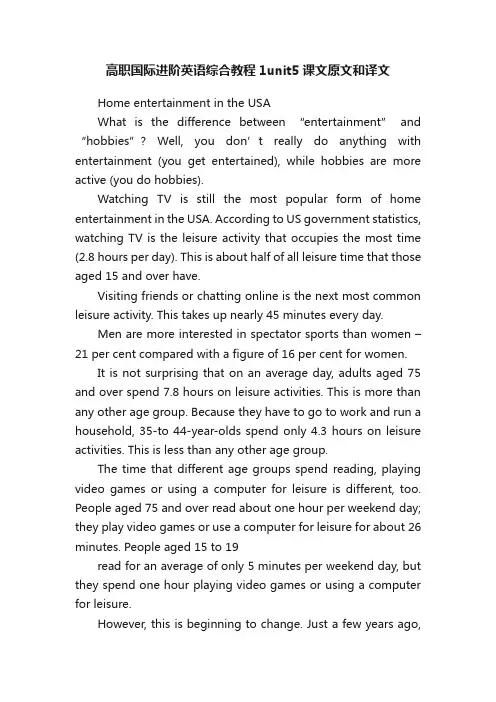
高职国际进阶英语综合教程1unit5课文原文和译文Home entertainment in the USAWhat is the difference between “entertainment” and “hobbies”? Well, you don’t really do anything with entertainment (you get entertained), while hobbies are more active (you do hobbies).Watching TV is still the most popular form of home entertainment in the USA. According to US government statistics, watching TV is the leisure activity that occupies the most time (2.8 hours per day). This is about half of all leisure time that those aged 15 and over have.Visiting friends or chatting online is the next most common leisure activity. This takes up nearly 45 minutes every day.Men are more interested in spectator sports than women –21 per cent compared with a figure of 16 per cent for women.It is not surprising that on an average day, adults aged 75 and over spend 7.8 hours on leisure activities. This is more than any other age group. Because they have to go to work and run a household, 35-to 44-year-olds spend only 4.3 hours on leisure activities. This is less than any other age group.The time that different age groups spend reading, playing video games or using a computer for leisure is different, too. People aged 75 and over read about one hour per weekend day; they play video games or use a computer for leisure for about 26 minutes. People aged 15 to 19read for an average of only 5 minutes per weekend day, but they spend one hour playing video games or using a computer for leisure.However, this is beginning to change. Just a few years ago,playing computer games and visiting social networking sites like Facebook or MySpace was something almost only young people did. Now, more and more older people are doing it. They find that it can be a wonderful way of relaxing after a hard day’s work.Text A课文译文美国的家庭娱乐“娱乐”与“爱好”区别在哪里呢?娱乐你无需做任何事情(你得到娱乐),而爱好则更加主动一些(你从事业余爱好)。
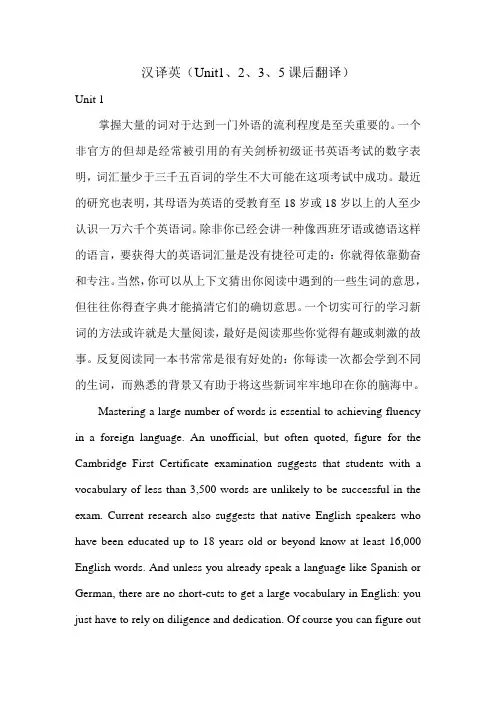
汉译英(Unit1、2、3、5课后翻译)Unit 1掌握大量的词对于达到一门外语的流利程度是至关重要的。
一个非官方的但却是经常被引用的有关剑桥初级证书英语考试的数字表明,词汇量少于三千五百词的学生不大可能在这项考试中成功。
最近的研究也表明,其母语为英语的受教育至18岁或18岁以上的人至少认识一万六千个英语词。
除非你已经会讲一种像西班牙语或德语这样的语言,要获得大的英语词汇量是没有捷径可走的:你就得依靠勤奋和专注。
当然,你可以从上下文猜出你阅读中遇到的一些生词的意思,但往往你得查字典才能搞清它们的确切意思。
一个切实可行的学习新词的方法或许就是大量阅读,最好是阅读那些你觉得有趣或刺激的故事。
反复阅读同一本书常常是很有好处的:你每读一次都会学到不同的生词,而熟悉的背景又有助于将这些新词牢牢地印在你的脑海中。
Mastering a large number of words is essential to achieving fluency in a foreign language. An unofficial, but often quoted, figure for the Cambridge First Certificate examination suggests that students with a vocabulary of less than 3,500 words are unlikely to be successful in the exam. Current research also suggests that native English speakers who have been educated up to 18 years old or beyond know at least 16,000 English words. And unless you already speak a language like Spanish or German, there are no short-cuts to get a large vocabulary in English: you just have to rely on diligence and dedication. Of course you can figure outfrom the context the meanings of some new words you come across in your reading, but more often than not you have to look them up in a dictionary in order to be clear about their accurate meanings. A practicable way to pick up new words may be to read a lot, preferably stories that you find interesting or exciting. It's often good to read the same book over and over again: every time you read it, you will learn different new words, and the familiar context helps to fix them in your mind.Unit 21、我认为向他求助是不现实的。
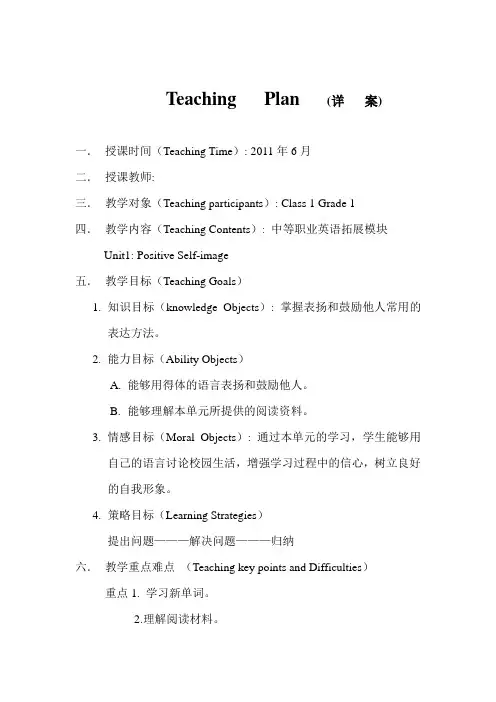
Teaching Plan(详案)一.授课时间(Teaching Time): 2011年6月二.授课教师:三.教学对象(Teaching participants): Class 1 Grade 1四.教学内容(Teaching Contents): 中等职业英语拓展模块Unit1: Positive Self-image五.教学目标(Teaching Goals)1.知识目标(knowledge Objects): 掌握表扬和鼓励他人常用的表达方法。
2.能力目标(Ability Objects)A.能够用得体的语言表扬和鼓励他人。
B.能够理解本单元所提供的阅读资料。
3.情感目标(Moral Objects): 通过本单元的学习,学生能够用自己的语言讨论校园生活,增强学习过程中的信心,树立良好的自我形象。
4.策略目标(Learning Strategies)提出问题———解决问题———归纳六.教学重点难点(Teaching key points and Difficulties)重点1. 学习新单词。
2.理解阅读材料。
难点:掌握阅读材料中的语言知识点。
七.教学方法(Teaching Methods): 课堂讲授八.教学辅助(Teaching Aids)1.Multimedia2.Blackboard九.教学步骤(Procedures)任务一(task 1)Greetings and Lead-in 导入T: Hello boys and girls. I’m your English teacher, I’m a positive girl and I’m enthusiastic at everything. I believe I can be a useful person and do great things for our society. How about you?Ss: …T: I have learned some students choose vocational school because of bad grades. So these students become more and more unconfident about themselves. How do you think about it? Which is more important, to be popular or to study well?Ss: …T: Do you want to change your self-image?Ss: …T: Today we’ll learn how to build positive self-image任务二(task 2)Text 1 阅读步骤1(Step 1)Help students to learn new words and finish the task.帮助学生学习新单词并完成词语搭配。
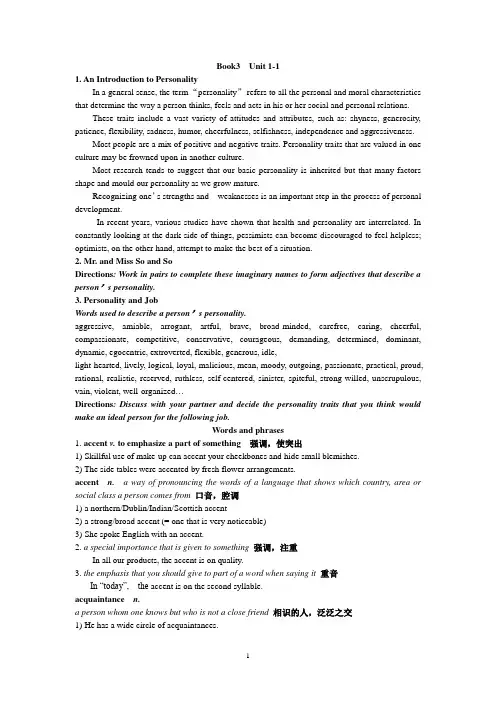
Book3 Unit 1-11. An Introduction to PersonalityIn a general sense, the term “personality”refers to all the personal and moral characteristics that determine the way a person thinks, feels and acts in his or her social and personal relations.These traits include a vast variety of attitudes and attributes, such as: shyness, generosity, patience, flexibility, sadness, humor, cheerfulness, selfishness, independence and aggressiveness.Most people are a mix of positive and negative traits. Personality traits that are valued in one culture may be frowned upon in another culture.Most research tends to suggest that our basic personality is inherited but that many factors shape and mould our personality as we grow mature.Recognizing one’s strengths and weaknesses is an important step in the process of personal development.In recent years, various studies have shown that health and personality are interrelated. In constantly looking at the dark side of things, pessimists can become discouraged to feel helpless; optimists, on the other hand, attempt to make the best of a situation.2. Mr. and Miss So and SoDirections: Work in pairs to complete these imaginary names to form adjectives that describe a person’s personality.3. Personality and JobWords used to describe a person’s personality.aggressive, amiable, arrogant, artful, brave, broad-minded, carefree, caring, cheerful, compassionate, competitive, conservative, courageous, demanding, determined, dominant, dynamic, egocentric, extroverted, flexible, generous, idle,light-hearted, lively, logical, loyal, malicious, mean, moody, outgoing, passionate, practical, proud, rational, realistic, reserved, ruthless, self-centered, sinister, spiteful, strong-willed, unscrupulous, vain, violent, well-organized…Directions: Discuss with your partner and decide the personality traits that you think would make an ideal person for the following job.Words and phrases1. accent v. to emphasize a part of something 强调,使突出1) Skillful use of make-up can accent your cheekbones and hide small blemishes.2) The side tables were accented by fresh flower arrangements.accent n. a way of pronouncing the words of a language that shows which country, area or social class a person comes from 口音,腔调1) a northern/Dublin/Indian/Scottish accent2) a strong/broad accent (= one that is very noticeable)3) She spoke English with an accent.2. a special importance that is given to something强调,注重In all our products, the accent is on quality.3. the emphasis that you should give to part of a word when saying it重音In “today”, the accent is on the second syllable.acquaintance n.a person whom one knows but who is not a close friend 相识的人,泛泛之交1) He has a wide circle of acquaintances.2) She is an old acquaintance.◆have a passing/nodding acquaintance with sb./sth.I must admit I have only a passing acquaintance with his books.◆make sb.’s acquaintance / make the acquaintance of sb.I made his acquaintance at a party.circulate v.1. to move around within a system, or to make something do this循环,环行1) Ceiling fans circulated warm air around the room.2) The condition prevents the blood from circulating freely.2. if information, facts, ideas etc. circulate, they become known by many people传播,流传Rumors began circulating that the Prime Minister was seriously ill.3. to talk to a lot of different people in a group, especially at a party交往I circulated among the guests during the party.contrast n.1. a difference between people, ideas, situations, things etc. that are being compared对比,对照1)While there are similarities in the two cultures, there are also great contrasts.2) The birth rate for older women has declined, but, by contrast, births to teenage mothers have increased.3) The stock lost 60 cents a share, in contrast to last year, when it gained 21 cents.4) The economic and social contrasts between the poor and the rich.2. something that is very different from something else: 形成对比的人或物1) The sauce is quite sweet, so add dried thyme as a contrast.2) The red stems of this bush provide a contrast to the drab brown of the winter garden.3. the degree of difference between the light and dark parts of a television picture, X-ray, photocopy etc.: 对比度,反差1) This button adjusts the contrast.2) The chemical heightens contrast between different kinds of tissue in the breast.contrast v.1. if two things contrast, the difference between them is very easy to see and is sometimes surprising形成对比1) The snow was icy and white, contrasting with the brilliant blue sky.2) These results contrast sharply with other medical tests carried out in Australia.2. to compare two things, ideas, people etc. to show how different they are from each other使成对比,使成对照1) In another passage, Melville again contrasts the land with the sea.2) The documentary contrasts the reality of war with its romanticized image.dwell(vi.) (dwelt or dwelled) (Line 31, Para. 4) 1) dwell in /at: reside居住2) dwell on / upon: think, speak or write at length about凝思;详细;论述;仔细研究不要过分沉溺在痛苦的回忆之中。
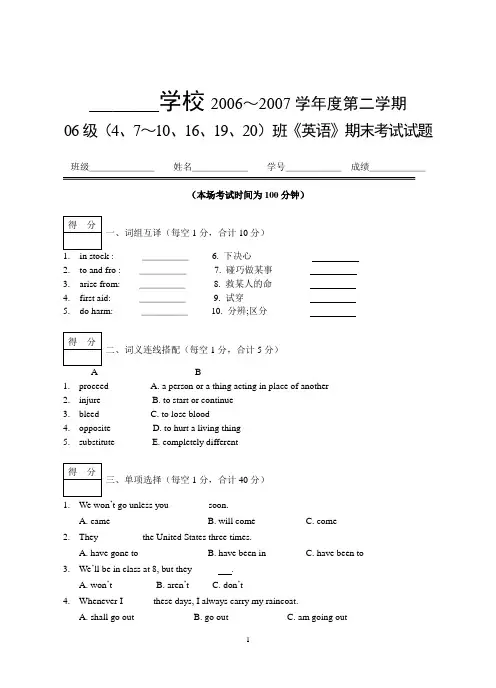
______学校2006~2007学年度第二学期06级(4、7~10、16、19、20)班《英语》期末考试试题班级_______姓名______学号______成绩______(本场考试时间为100分钟)一、词组互译(每空1分,合计10分)1.in stock : _____ 6. 下决心2.to and fro : _____7. 碰巧做某事3.arise from: _____8. 救某人的命4.first aid: _____9. 试穿5.do harm: _____10. 分辨;区分二、词义连线搭配(每空1分,合计5分)B1.proceed A. a person or a thing acting in place of another2.injure B. to start or continue3.bleed C. to lose blood4.opposite D. to hurt a living thing5.substitute E. completely different三、单项选择(每空1分,合计40分)1.We won’t go unless you ________soon.A. cameB. will comeC. come2.They _________the United States three times.A. have gone toB. have been inC. have been to3.We’ll be in class at 8, but they _____ .A. won’tB. aren’tC. don’t4.Whenever I ______these days, I always carry my raincoat.A. shall go outB. go outC. am going out5.I think she _______ now.A. is readingB. readsC. read6.He told me I _______better take a train.A. had hadB. hadC. should have7.What ________ from 9 to 11 last night?A. had you doneB. have you doneC. were you doing8.We ______ a monthly test two hours ago.A. had already hadB. have hadC. had9.They ___________for some time when a message came.A. were drinkingB. had drunkC. had been drinking10.The singer lived in California until he ______ to university.A. had been sendingB. was sendingC. was sent11.Please tell me why you _______ from school last week.A. have been absentB. were absentC. had been absent12.Twelve inches ______ one foot.A. makeB. makesC. is making13.While he ______ the advertisement, a door somewhere behind him opened.A. was staring atB. is staring atC. was stared at14.Mary was caught in a traffic jam and by the time she arrived at the airport her mother’s plane__________.A. was taken offB. had already taken offC. took off15.While Tom _____ a basketball match, his brother was reading an interesting novel in hisroom.A. watchesB. had watchedC. was watching16.He ______ to meet us at the station but he didn’t see us.A. did wentB. did goC. didn’t go17.They _______ that school had already opened.A. thinkB. thoughtC. had been thinking18.When I entered the room, he ________for his watch.A. was searchingB. has searchedC. searched19.I knew I could not finish the homework _______.A. when he comesB. until he has comeC. before he came20.Jane got sick last January and ______ in bed since then.A. wasB. has beenC. had been21. I ask your name?A. WillB. ShallC. MayD. must22. repeat the question?A. Shall IB. Will IC. Would you like that ID. Do you want that I23. I have neither a raincoat nor an umbrella. That’s why I wait until the rain stops.A. mustB. shouldC. oughtD. have to24. You look pale. You ill.A. can beB. must beC. should beD. have to be25. She speak four languages.A. canB. can be able toC. need toD. must have to26. I help myself to some more food?A. OughtB. DareC. MayD. Would27. It was so dark outside that he didn’t .A. to dare to fetch some waterB. dare to go out bring some waterC. dare fetch some waterD. dare to go out to fetch some water28. Mr. Li be in Shanghai because I saw him in town only a few minutes ago.A. mustn’tB. may notC. can’tD. isn’t able to29. Since she is angry, we .A.had better to leave her aloneB.should leave her aloneC.had to leave her aloneD.ought leave her alone30.—It Mary who is in the office.—I’m sure it her. I saw her off at the airport just 20 minutes ago.A.can’t be …can’t be B.must be …mustn’t beC.must be …can’t be D.can’t be … mustn’t be31.You angry with her., for she is very young.A.need not be B.don’t need to C.need not to be D.need not32.She _____ for what she has done.A.ought to praise B.ought be praisedC.ought to be praising D.ought to be praised33.I not get away any sooner although I had planned to leave earlier.A. should B.would C.could D.might34.How so?A.dare you to say B.dare you say C.do you dare say D.dare to say 35.Although he tried, he not make it.A.would B.should C.might D.could36.I get this done immediately or it will be too late.A.must B.will C.may D.shall37.----My goodness, I just missed the train.----That’s too bad. I’m sure you it, if you had hurried.A.could have caught B.had caughtC.would catch D.could catch38.Look, what you have done! You more careful.A.may be B.had to be C.should have been D.would be39.—I haven’t felt well for a week.—You see a doctor.A.had better B.had rather C.had ought D.should have to40.You in your exercises in time so that you can get them back now.A.should hand B.shall handC.shall have handed D.should have handed四、用下列方框中的词组填空,并适当改变其形式(每空1分,合计10分)2.The dog ______ 4 puppies.3.How should I ___ finding a job?4.If you are using gas, _______ that a window is open.5.They were not able ______ all his injuries, so they took him to hospital.6.You’d better _______ the part of the body which is bleeding.7.If you’re coming to Shanghai, please let me know _____ .8.The film a short story written by my father.9.They a lot of difficulties.’t work for him..1分,合计10分)of new supermarkets and shopping centers has been continuing 1 the past forty years. Supermarkets continue to 2because they offer the customers choice of products in one place---when a housewife passes 3the various items, she will find nearly all4she wants to buy so that when she leaves, she will not shop 5else. 6the large amount of goods sold, supermarkets can offer lower prices than small old-style grocery stores can. Thus, supermarkets have been 7and they have become an essential part of the way Americans shop.With the rise of supermarkets and shopping centers, American society has 8some changes. Most obviously, many small old-style grocery stores have disappeared, driven out of business by the supermarkets. Now Americans use cars even more 9get to and carry products from the shopping centers, which are typically located farther from many homes.There’s 10about it---the number of supermarkets and large shopping centers is still increasing.1.A.above B.over C.on D.at2.A.arrive B.reach C.appear D.disappear3.A.by B.through C.away D.to4.A.good B.goods C.product D.item5.A.where B.nowhere C.somewhere D.anywhere 6.A.Because B.As C.Because of D.Apart from 7.A.popular B.popularity C.flourished D.possible 8.A.expressed B.experienced C.gone on D.expensive9.A.in order that B.in order to C.so that D.forB.clean C.without doubt D.no doubt六、阅读理解(每空1分,合计15分)AMost areas in Britain have corner shops for local people. Corner shops often keep longer hours than the big street shops. Their Slightly higher prices are usually made up for by their convenience. There are also discount shops. These shops sell films, paintings, etc. On the whole, supermarkets and street markets are cheaper places to buy food. Street markets are usually good for fresh fruit and vegetables, and, in many places they have many foreign goods which may make you think of your home!There are also “convenience ” food stores in Britain. They may sell cooked food and they are useful for people in a hurry.1.What can be said about corner shops?A. They keep longer hours.B. They are high-street shops.C. They are only for locals.2. Which shop often makes you think of home?A. A corner shopB. supermarketC. Street market3. What do street market shops also do?A. Sell preparation.B. Sell cooked food.C. Cook food for you..BCool is a word with many meanings. Its old meaning is used to express a termperature that is a little bit cold. As the world has changed, the word has had many different meanings.Cool can be used to express feelings of interest in almost anything.When you see a famous car in the street, maybe you will say, “It’s cool.”You may think, “He’s so cool.” when you see your favorite footballer.We all maximize the meaning of cool. You can use it instead of many word such as new or surprising. Here’s an interesting story we can use to show the way the word is used. A teacher asked her students to write about the waterfall they had visited. On one student’s paper was just the one sentence. It’s so cool. Maybe he thought it was the best way to show what he saw and felt.But the story also shows a scarcity of words. Without cool, some people have no words to show the same meaning. So it is quite important to keep some credibility. Can you think of many other words that make your life as colorful as the word cool? I can. And I think they are also very cool.4. We know the italicized word “cool” has had _____.A. only one meaningB. no meaningsC. many different meaningsD. two meanings5. The italicized word “express” in the passage means “_____”.A. seeB. showC. knowD. feel6. If you are _____ something, you may say, “It’s cool.”A. interested inB. strange toC. worried aboutD. unhappy with7. The writer takes an example to show he is _____ the way the word cool is used.A. pleased withB. careful aboutC. worried aboutD. excited atCA businessman, who always tried to pay as little as possible for what he needed, felt ill one day. He decided to go to a doctor and ask a friend to recommend one.“Dr. Smith has a good reputation,” the friend told him.“Is he expensive?” the businessman asked.“Yes and no. He charges five hundred dollars for the first visit, but only twenty-five dollars for each visit after that.”“That seems reasonable,” the businessman said, and went to visit Dr. Smith. As he walked into the consulting room, he said, “well, here I am again, doctor,” and put twenty-five dollars on the table.The doctor looked at him carefully for a moment, then smiled and put the money into thedrawer. “Thank you,” he said, “and what can I do for you today?”“Examine me, of course,” the businessman said, “and tell me what’s wrong with me.”“Oh, there is no need for me to examine you again,” the doctor said. “Just continue taking the medicine I prescribed for you when you came to me last time.”8. Why did the businessman say to the doctor “well, here I am again”?A. He had visited the doctor many times.B. It was the second visit to the doctor.C. He had already paid 500 dollars for his first visit.D. He wanted the doctor to think he had visited him before.9. What did the doctor do for the businessman?A. He gave him a prescription.B. He examined him.C. He cured him.D. Nothing.10. Why did Dr. Smith smile as he took the twenty-five dollars?A. He found the businessman telling a lie.B. He was pleased with the high pay.C. They were old friends.D. Doctors are always polite to their patients.DVancouver is rapidly becoming one of the most exciting cities in the world today.In a single century, the city has grown from a few wooden structures to become the third largest city in Canada, with a population of some 1.5 million. And in the last decade, Vancouver has entered the world stage, with a first-class convention centre, updated cruise ship facilities and a multitude of services for travelers, including hotel, restaurant and shopping to satisfy every taste. Yet the city still keeps the freshness, friendliness and natural beauty that have always made the “playground of the Pacific” a wonderful place to live or visit.6.What is mainly discussed in this passage?A.Wooden structures.B. A first-class convention centre.C.Updated cruise ship facilities.D.Vancouver.7.How long has it taken Vancouver to become the third largest city in Canada?A. A decade.B. Five hundred years.C. One hundred years.D. Three hundred years.13. What’s the population of Vancouver?A. 1 millionB. 1.5 millionC. About 1.5 millionD. About 1 million14. What has happened to V ancouver in the last decade?A. It has been visited by more travelers.B. It has entered the world stage.C. More hotels have been built in the city.D. More restaurants have been built in the city.15. What has made Vancouver a wonderful place to live or visit?A. Its freshness, friendliness and natural beauty.B. Its new playground.C. Its updated facilities.七、翻译(每空一词1分,合计10分)!_____ ______ happy life we are living!2.你应该尽可能做好本职工作.You should do your work _____ well _______ _______.3.他和他妻子分居.He and his wife are living _______.4.你要什么东西可以找医生.______ the doctor ______ what you want.5.这家商店为我们提供食品.This shop _______ food _____ us._________学校2006~2007学年度第一学期06级(4、7~10、16、19、20)班《英语》期中考试试题答题纸班级_______姓名______学号______成绩______(本场考试时间为100分钟)一、词组互译(每空1分,合计10分)1._________ 6.2._________7.3._________8.4._________9.5._________10.二、词义连线搭配(每空1分,合计5分)四、用下列方框中的词组填空,并适当改变其形式(每空1分,合计10分)1.________ 6.________2.________7.________3.________8.________4.________9.________10. ________五、完形填空(每空1分,合计10分)六、阅读理解(每空1分,合计15分)七、翻译(每空一词1分,合计10分)__________2. _________ __________ ___________3. _________4. _________ __________5. _________ __________答案一、10分1.在贮存中;现有 6.make up one’s mind2.来回地,往复地7.happen to do sth.3.由…引起,由…而产生8.save one’s life4.急救9.try on5.损害10. tell apart二、5分BDCEA三、40分CCABA BCCCCBBABC BBACBCADBA CDCBCADCBD AACAD四、10’1. is blessed with 6. hold up2. gave birth to 7. in advance3. go about 8. is based on4. make sure 9. are faced with5. to deal with 10. In that case五、10’BCABD CABBD六、15’ACBCB ACDDADCCBA七、10’1. What a2. as as possible3. apart4. Ask for5. provides for11。
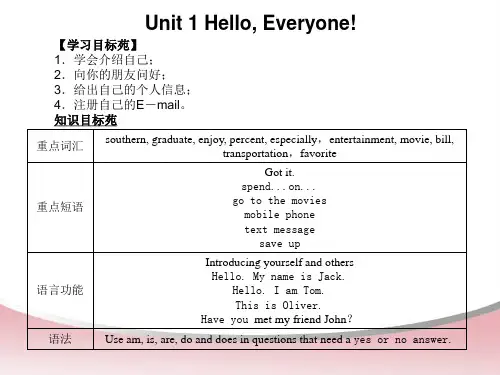
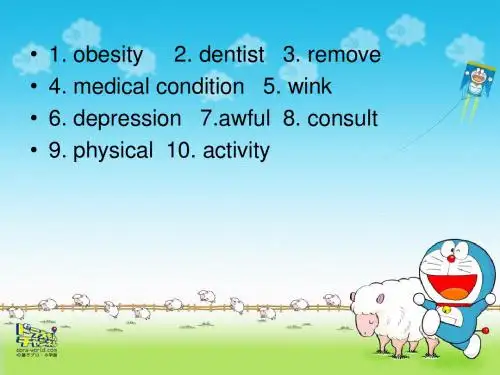
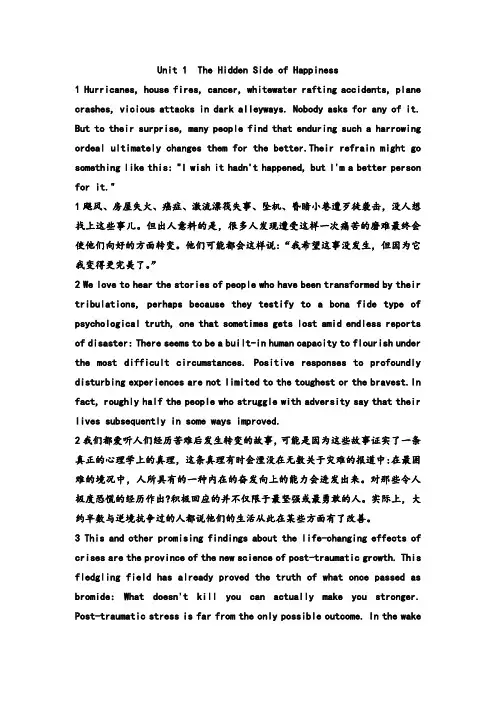
Unit 1 The Hidden Side of Happiness1 Hurricanes, house fires, cancer, whitewater rafting accidents, plane crashes, vicious attacks in dark alleyways. Nobody asks for any of it. But to their surprise, many people find that enduring such a harrowing ordeal ultimately changes them for the better.Their refrain might go something like this: "I wish it hadn't happened, but I'm a better person for it."1飓风、房屋失火、癌症、激流漂筏失事、坠机、昏暗小巷遭歹徒袭击,没人想找上这些事儿。
但出人意料的是,很多人发现遭受这样一次痛苦的磨难最终会使他们向好的方面转变。
他们可能都会这样说:“我希望这事没发生,但因为它我变得更完美了。
”2 We love to hear the stories of people who have been transformed by their tribulations, perhaps because they testify to a bona fide type of psychological truth, one that sometimes gets lost amid endless reports of disaster: There seems to be a built-in human capacity to flourish under the most difficult circumstances. Positive responses to profoundly disturbing experiences are not limited to the toughest or the bravest.In fact, roughly half the people who struggle with adversity say that their lives subsequently in some ways improved.2我们都爱听人们经历苦难后发生转变的故事,可能是因为这些故事证实了一条真正的心理学上的真理,这条真理有时会湮没在无数关于灾难的报道中:在最困难的境况中,人所具有的一种内在的奋发向上的能力会进发出来。

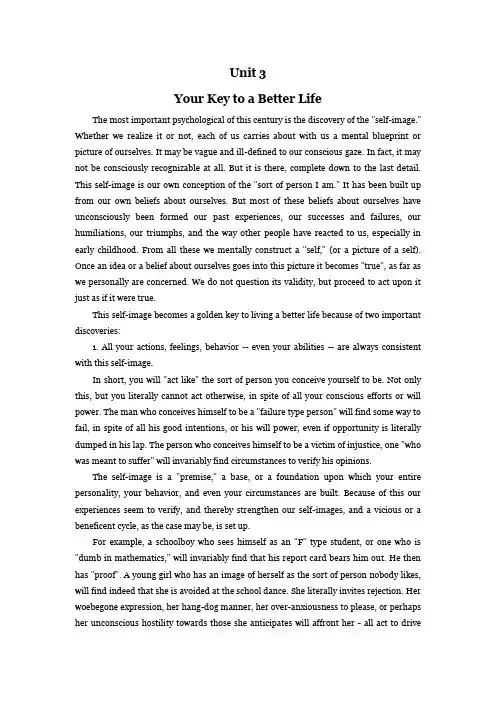
Unit 3Your Key to a Better LifeThe most important psychological of this century is the discovery of the "self-image." Whether we realize it or not, each of us carries about with us a mental blueprint or picture of ourselves. It may be vague and ill-defined to our conscious gaze. In fact, it may not be consciously recognizable at all. But it is there, complete down to the last detail. This self-image is our own conception of the "sort of person I am." It has been built up from our own beliefs about ourselves. But most of these beliefs about ourselves have unconsciously been formed our past experiences, our successes and failures, our humiliations, our triumphs, and the way other people have reacted to us, especially in early childhood. From all these we mentally construct a "self," (or a picture of a self). Once an idea or a belief about ourselves goes into this picture it becomes "true", as far as we personally are concerned. We do not question its validity, but proceed to act upon it just as if it were true.This self-image becomes a golden key to living a better life because of two important discoveries:1. All your actions, feelings, behavior -- even your abilities -- are always consistent with this self-image.In short, you will "act like" the sort of person you conceive yourself to be. Not only this, but you literally cannot act otherwise, in spite of all your conscious efforts or will power. The man who conceives himself to be a "failure type person" will find some way to fail, in spite of all his good intentions, or his will power, even if opportunity is literally dumped in his lap. The person who conceives himself to be a victim of injustice, one "who was meant to suffer" will invariably find circumstances to verify his opinions.The self-image is a "premise," a base, or a foundation upon which your entire personality, your behavior, and even your circumstances are built. Because of this our experiences seem to verify, and thereby strengthen our self-images, and a vicious or a beneficent cycle, as the case may be, is set up.For example, a schoolboy who sees himself as an "F" type student, or one who is "dumb in mathematics," will invariably find that his report card bears him out. He then has "proof". A young girl who has an image of herself as the sort of person nobody likes, will find indeed that she is avoided at the school dance. She literally invites rejection. Her woebegone expression, her hang-dog manner, her over-anxiousness to please, or perhaps her unconscious hostility towards those she anticipates will affront her - all act to driveaway those whom she would attract. In the same manner, a salesman or a businessman will also find that his actual experiences tend to "prove" his self-image is correct.Because of this objective "proof" it very seldom occurs to a person that his trouble lies in his self-image or his own evaluation of himself. Tell the schoolboy that he only "thinks" he cannot master algebra, and he will doubt your sanity. He has tried and tried, and still his report card tells the story. Tell the salesman that it is only an idea that he cannot earn more than a certain figure, and he can prove you wrong by his order book. He knows only too well how hard he has tried and failed. Yet, as we shall see later, almost miraculous changes have occurred both in grades of students, and in the earning capacity of salesmen - when they were prevailed upon to change their self-images.2. The self-image can be changed. Numerous case histories have shown that one is never too young nor too old to change his self-image and thereby start to live a new life. One of the reasons it has seemed so difficult for a person to change his habits, his personality, or his way of life, has been that heretofore nearly all efforts at change have been directed to the circumference of the self, so to speak, rather than to the center. Numerous patients have said to me something like the following: "If you are talking about 'positive thinking', I've tried that before, and it just doesn't work for me." However, a little questioning invariably brings out that these individuals have employed "positive thinking," or attempted to employ it, either upon particular external circumstances, or upon some particular habit or character defect ("I will get that job." " I will be more calm and relaxed in the future." "This business venture will turn out right for me," etc.) But they had never thought to change their thinking of the "self" which was to accomplish these things.Jesus warned us about the folly of putting a patch of new material upon an old garment, or of putting new wine into old bottles. "Positive thinking" cannot be used effectively as a patch or a crutch to the same old self-image. In fact, it is literally impossible to really think positively about a particular situation, as long as you hold a negative concept of self. And, numerous experiments have shown that once the concept of self is changed, other things consistent with the new concept of self, are accomplished easily and without strain.One of the earliest and most convincing experiments along this line was conducted by the late Prescott Lecky, one of the pioneers in self-image psychology. Lecky conceived of the personality as a "system of ideas", all of which must seem to be consistent with each other. Ideas which are inconsistent with the system are rejected, "not believed," and not acted upon. Ideas which seem to be consistent with the system are accepted. At thevery center of this system of ideas -- the keystone -- the base upon which all else is built, is the individual's "ego ideal," his "self-image," or his conception of himself. Lecky was a school teacher and had an opportunity to test his theory upon thousands of students.Lecky theorized that if a student had trouble learning a certain subject, it could be because (from the student's point of view) it would be inconsistent for him to learn it. Lecky believed, however, that if you could change the student's self-conception, which underlies this viewpoint, his attitude toward the subject would change accordingly. If the student could be induced to change his selfdefinition, his learning ability should also change. This proved to be the case. One student who misspelled 55 words out of a hundred and flunked so many subjects that he lost credit for a year, made a general average of 91 the next year and became one of the best spellers in school. A boy who was dropped from one college because of poor grades, entered Columbia and became a straight "A" student. A girl who had flunked Latin four times, after three talks with the school counselor, finished with a grade of 84. A boy who was told by a testing bureau that he had no aptitude for English, won honorable mention the next year for a literary prize.The trouble with these students was not that they were dumb, or lacking in basic aptitudes. The trouble was an inadequate self-image ("I don't have a mathematical mind"; "I'm just naturally a poor speller"). They "identified" with their mistakes and failures. Instead of saying "I failed that test" (factual and descriptive) they concluded "I am a failure." Instead of saying "I flunked that subject" they said "I am a failure." Instead of saying "I flunked that subject" they said "I am a flunk-out." For those who are interested in leaning more of Lecky's work, I recommend securing a copy of his book: self consistency, a Theory of Personality. The Island Press, Now York, N.Y.美好生活的秘决这个世纪心理学领域里最重要的发现就是“自我行象”。
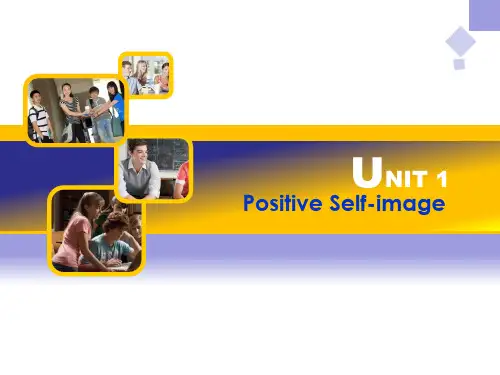
上外版大学英语精读第5册1-8单元完整版翻译答案(包括短文翻译)Passage TranslationUnit1 page 12Mastering a large bank of vocabulary is crucial to speak a foreign language fluently. Unofficial but often quoted statistics about Cambridge First Certificate Examination show that students whose vocabulary less than 3500 words are less likely to pass this exam.The recent research also indicates that the native English speakers educated to or above 18 years old know at least 16000 English words.Unless you can speak a language like Spanish or German already, there is no short-cut to a large vocabulary: you have to depend on diligence and dedication.Of course, you can infer from the context the meaning of some new words you come across in reading, but you often have to look up in a dictionary to clarify their exact meanings.A practical method to learn new words may be reading widely, especially those you find interesting or exciting.Reading the same book repeatedly i s of great use: You’ll learn different new words every time you read, and the familiar context also helps to engrave those new words on your mind deeply.Unit 24. page 361) I don’t think it is realistic to turn to him for help. As a matter of fact, he himselfis in need of help.2) More and more people are being awakened to the urgent need of combating airpollution.3) There are visible signs that some of the time-honored old traditions and valuesare no longer cherished by the young people.4) Many of us find the notion of the immeasurable (boundless) universe hard to grasp.5) Because of so many loopholes in the laws and regulations, it is little(small)wonder that a handful of speculators got rich overnight.6) An unprecedented boom in tourism brought sudden prosperity to the smallborder town, which was formerly inhabited by only three hundred people.7) In the light of this information, that country already has the capabilities to makenuclear weapons.8) Regardless of repeated warnings from his friends, he staked all his money onhigh-risk ventures.Unit3 page 65If you set out to do some business but failed, do not lose your confidence. There are great differences between that “I failed three times” and “I am a failure”. As long as you try to learn from your failure instead of holding a negative view about yourself or identifying with failure, you are very likely to succeed in the future. Have you ever thought that those who have failed again and again are always the victims of bad self-image? They failed often because of not external reasons but internal reasons.Countless examples verify that if those people could be prevailed on the change of their view and set up positive self-image, their performance would change miraculously. Success can come at any time, whenever you are thirty, forty or when itseems that you have failed all your life. Success in early years is sweet, but the late one is tastier.Unit4 Page 874.1) Far from being permissive, many parents are putting tremendous pressure on their children to beexceptional in everything.2) Owing to her academic excellence, this Changsha girl has been accepted by several prestigious,American universities, including Harvard, Yale and MIT.3) Many parents start their children in piano or violin lessons at ever-earlier ages in hopes that theywill become exceptional pianists or violinists.4) In modern society, clothing styles change yearly. Some are in this year but will be out the next.5) More likely than not, what this“new” parenting idea brings about will be“super problems”rather than “super kids”.6) Young people should be given the opportunity to take the initiative, to take responsibility fortheir mistakes and credit for their achievement.7) In my view, he is so weak-willed that he could hardly give up smoking. To my surprise, he haseasily cured himself of this bad habit.8) Demands on students have to be tailored to their interests and abilities.Unit5Scientists are a small group of people who are striving to gain insight into nature and seek for laws in the superficial disorder. They have a special ability to think and analyze, and unlimited patience in observing and collecting data. However, not all scientific discoveries can be ascribed to (归因于) abilities and patience; they usually connect closely with creative imagination. Of course, the leap of imagination is often the first step leading to discoveries. Moreover, scientists are famous for their honesty. They put a high premium to honesty, mainly because their honesty is crucial to their career. Every theory they put forward has to be further tested. Ever error and lie are sure to be found. So, if finding some evidence contradicting with their ideas, scientists modify even abandon their ideas, instead of concealing them. In this way, they accumulate an immense amount of knowledge, which can help us understand ourselves and surroundings better.Unit6One day, we received an invitation from my father to his sixtieth birthday party. Jenny regarded it as my father’s actively reaching out to reconciliation, so we should accept it. I was in the midst of abstracting an important case and preparing for the coming exams at that time, hence I only used the simplest words to tell her no day to reconcile forever. My refusal apparently made Jenny depre ssed, but as a rational woman, she didn’t quarrel with me. She just tried to persuade me. But it only made me furious, thinking that Jenny made me upset deliberately. I must have been crazy then, because I did a thing for which I would never forgive myself—I shouted at Jenny and hurled the phone at her. When I turned back to see her, she had alreadydisappeared. I went out to look for her everywhere, but in vain. I was scared to death, not knowing what to do next. When I was going to give up, I suddenly saw Jenny sitting in front of our house. I walked forward to her, saying“Jenny,I’m sorr y—”But she interrupted my apology and said, “ Love means not ever having to say sorry.”Unit74.1. When I was a kid, I was so fascinated with the idea of travelling round the world that I would spend hours in my grandfather’s sanctum for several hours, rolling the globe and dreaming of the places I would like to visit.2. A time bomb exploded this afternoon in one of London’s biggest supermarkets, evoking a great panic among people.3. Accompanied by his father, Bill went to the police station and confessed to the police officer that he had robbed an old man of his gold watch two weeks ago.4. After getting engaged to Jane, Stephen started working hard for the first time in his life. And before long he distinguished himself as a young theoretical physicist.5. Prof. Stone is well-know for his sternness. But, to everyone’s surprise, the speech he made at his daughter’s wedding last Saturday was full of wit and humor.6.To our surprise, there are so many people willing to do voluntary work for the benefit of the community.Unit81.The increasing prosperity of the country in a sense owes the government’s policyof economic reform.2.The Negro leader regarded it as his sacred obligation todevote himself to realizingracial equality.3.In 1976, the three main architects of the People’s Republic of China—PremierZhou Enlai,Marshal Zhu De and Chairman Mao Zedong died in sequence.4.I reminded the headmaster more than once of his promise to protect the retiredteacher’s legitimate behalf.5.The main idea of the story is that one’s destiny ties up with the whole country’s.6.The riches the young man fell heir to made him realize his dream.。
1 Nothing Succeeds like the Appearance of SuccessEvery winner has a winning image ,which is called charisma ,charm ,personality ,style, flair or grace. Is it possible for someone to succeed without doing any hard work. The answer is certainly no. As we know, a man who is successful have to be a man who had done all the hard works he had to on his way to succeed, and overcome all the difficulties. He or she also have to be a person who has positive qualities which will help him a lot.For example, the famous basketball player whose name is Y ao ming.Did he overcome a lot of difficulties? Y es, he did for sure. As a basketball player,he practices everyday for many times, again and again, never stop, and never give up. For so many years, he has been keeping his mind. Finally, he became one of the most famous basketball player of the NBA. He proved his worthy and also proved his success.Everyone who became successful like Yao ming was just working hard like him.Every winner has their own stories. They all show that nothing succeeds like the appearance of succeeds.2How to win love?There is a common opinion in the world about love. It's that love is a mixture of friendship and respect and appetite. Benjamin Franklin said,"If you would be loved,love and be lovable." If we want win love,we should double our efforts to improve ourselves according those three relationships above.Furthermore,in my opinion,winning love can be divided into two parts.One is how to win your object's heart when you are in pursuit of her(him).The other is how to keep the love after you have built a love relationship with your object.For the first situation,the key point is attracting your object's attention and making her fall in love with you.Tell her you love her strictly.Never talk about your love in a joking voice.Show her your advantages and tell her your disadvantages honestly.If she's gotten in trouble,go to help her as quickly as your can.Respect her works and her discissions.If you have done like these methods above,you have became a good friend with your object.To become a couple of lovers,you need the last cause,that is sexual attraction.Good look is only a little cause of sexual attraction.Clean dresses,good manners,decisive characters and responsibilities can make one(both for men and women)more attractive.For the second situation,if you want to keep love,keep doing what you did when in pursuit of her.Never do as the stupid fish-man who said,"Why should I give it bait when I've gotten the fish?"A couple kept for many years looks more like friends than lovers,that is where friendship,respect and appetite work.Then,young boys,take my suggestion and go to find your happiness!3What Does the Fable mean to Me?The moral lesson of The Ant and the Grasshopper is: Idleness brings want. But the author tells us a story of George and Tom to show his disagreement. I am inspired by the two stories, but I think the moral of the fable is that one must keep a good balance between material and spirit.Firstly, material is the base of our living. So we should be industrious, just as the ant is busy gathering its winter store and George goes to work everyday. Industry can bring us food, help us make a living for our family, and even promote the social development. On the contrary, if everyone is idle, spends all day singing just like the grasshopper, or everyone is Tom--gambles,flirts with prettiest girls and even blackmails his own brother, we would beperfectly worthless and do harm to our family or society.Secondly, spirit is our ultimate pursuit. Life is colorful. We shouldn’t be working like a horse all day, the life of the ant and George are too boring. We can live a happy life—sing and dance when we want, eat delic ious food, live in expensive restaurant occasionally, and so on. We can do something interesting just like the grasshopper and Tom , but we should not violate moral principle.In short, we should be industrious but don’t regard work as your whole life, and we can make our life colorful but do observe moral discipline.There is a common opinion in the world about love. It's that love is a mixture of friendship and respect and appetite. Benjamin Franklin said,"If you would be loved,love and be lovable." If we want win love,we should double our efforts to improve ourselves according those three relationships above.Furthermore,in my opinion,winning love can be divided into two parts.One is how to win your object's heart when you are in pursuit of her(him).The other is how to keep the love after you have built a love relationship with your object.4E-mail A Blessing or A Curse?E-mail has become a part of certain importance in almost everybody's daily life, maybe billions of emails are exchanged on the internet everyday. But with the quick development of internet and email technologies, there also are some bad impacts of email to people's life. For example, the worst can be called junk mails. Just like its name, it's really a kind of junk on the internet and your mailbox,there's nothing that matters with you or even contains some kind of virus sometimes, imagine this you are busy with your work everyday, and a most important part of your job is to check the email and reply to your customs, but when you open you mailbox, all you find is those Junk Mails! They might be called curse by some people, as it really influences your mood in life or work, or even worse what if the junk mail has some virus in it? When you open the mail unconsciously, you may have a big problem to deal with, nobody wants that to happen don't we. I just wonder why there are so many people creating junk mail everyday and send it to people all around the world! Y eah, it's better to find something useful in some junk mails, but seldom you can do that. However, we have to say all the things in the world have their bad and also good aspects at the same time, we just can't doubt about it. For emails, we have to consider that without it, a most part of people in the world would be died! People use emails to transfer informations emotions and other feelings! For a student studying abroad, it's definitely significant for him or her to send emails to parents, as you can see, emails are much cheaper than phone calls and much convenient sometimes. Love maybe the things talked about in most emails. If you can't say "I love Y ou" in a real world, you may choose to send an email to him or her instead, that's much easier and also efficient. So when talking about things just like above, we have to admit that e-mails are blessing, at least it's more blessing than execrative. Thank god I haven't received too many junk mails but Blessing mails so far!5Humor-A Pillow That Cushions the BlowA sense of humor, God's greatest gift to mankind, is universally considered the most valuable personality. It is born within every person's heart,but has to be cultivated.A person without humor is just like a spring without flowers, or like a dish without seasoning. In a sense, your personalitylies in your sense of humor. Humor can improve physical as well as mental well-being. It helps us bear our burdens, lessen our tension, overcome our frustration. With a piece of joke, all our worries and sadness disappear like smoke, and we are full of vigor once again. Humor helps us live in harmony with others. It is unavoidable to have misunderstanding and tension with others during work and study.But humor can ease these problems quicker than angry words or quarrels. With it you can always keep on good terms with others. A sense of humor is really one of the keys to happiness. It gives fun and zest to life to make it worth livingmy attitude towards lifeTime flies! With each blink, I am getting old. Now I am already a twenty-year-old boy. As we all know, many people have done something successfully at this age,but I haven't . I have been blaming myself so much recently and I think I must do something to change the situation. First of all,I will set a exact goal for myself which is~~~~ secondly,I will make a long-term plan and also a schedule by which I can manage my time resonably Thirdly,to fufill my plan I will insist on working hard and if there are any problems with my plan, I will correct them in time ~~ I believe an old saying which is "action speak louder than words' So no matter how many setbacks are waiting for me and whatever I will sacrifice to achieve my goal , I will never give up !。
Unit 5 Birds Flying BackwardsGood afternoon, everyone, It’s my pleasure to be here and share my lesson with you. The content of my lesson is from Higher V ocational English Book1, Unit 5 Birds Flying Backwards.I’ll explain how to teach and why to do so from the following 7 aspects:analysis of the teaching material, the learners, the teaching methods, the learning methods, the teaching procedures, the blackboard design, and reflections after teaching.First, let me talk about the teaching material.Ⅰ. Analysis of Teaching Material (教材分析):My understanding of the teaching material includes 3parts: the status and function, teaching objectives, the important and difficult points.At the beginning, let’s focus on the first part--- Status and function. The content of this lesson is from Higher V ocational English Book 1, Unit 5 Birds Flying Backwards. It is a reading course. In this class, the students will learn a story of film directing. And it is an interesting story. By learning this, the students will have more interest in learning English.Since it’s a reading course, it plays an important part in the English teaching. As we all know, reading belongs to the input during the process of the language learning. The input has a great effect on output, such as speaking and writing.So it is a good material to train Ss’ abilities of listening, speaking, reading and writing.That’s all for the first part, now let’s move to the second part.After analyzing the teaching material, I think the teaching objectives are as follows,1. Knowledge objectives1) To help Ss have a better understanding of the passage.2) To help Ss learn some new words and phrases. E.g.: expensive, crew, sunrise, sunset, director, etc.2. Ability objectives1) To develop Ss’ abilities of listening, speaking, reading and writing.2) To develop Ss’ reading skills, such as skimming, scanning, summarizing andguessing the new words from the context.3. Moral objectives1) To develop the Ss’ cooperative learning.2) To arouse Ss’ interest in learning EnglishWell, so much for the teaching objectives, let's come to deal with the third part: the important and difficult points.I think the important points of this class are:1) The meaning of the text.2) Some new words and phrases, such as expensive, crew, sunrise, sunset, etc.The difficult point of this class is Ss’ reading skills, such as skimming, scanning, summarizing and guessing the new words from the context.Ⅱ. Analysis of the learners (学情分析)Ok, let’s move to the analysis of the learners. The students of this class are in Grade One. They have adapted themselves to the new learning condition and have got a better learning ability than middle school students. They have known the importance of learning English, so in everyday class, they are always very active and eager to take part in the class activities. Therefore, the teacher should design a variety of activities, from easy to difficult, to arouse Ss’ interest in learning English, and then help them learn by doing.Ⅲ. Teaching Methods (说教法)Now let’s move to the teaching methods.In this class, I will mainly adopt task-based language teaching, situational language teaching, communicative approach and constructive approach in this class.The task-based language teaching is the main teaching method of this class. That’s to say, the whole class will be carried out by different kinds of tasks. During these tasks, the students will become the center of this class, while the teacher will act as an instructor. In this way, the learners will experience the knowledge by themselves and eventually acquire it.Ⅳ. Learning Methods (说学法):As for the learning methods, I will encourage Ss to learn through questioning and answering, cooperative learning and role play. That’s to say, Ss will mainly learn this text by finishing a lot of tasks. During the learning process, they need to have discussions with others and cooperate well with each other. And in the end of this class, they will do a role play to have a better understanding of the text.Ⅴ. Teaching Procedures(说过程):Here comes the most important part, the teaching procedures.It includes 4 steps: Step1 Pre-reading, Step2 While-reading, Step3 Post-reading, and Step4 Homework.Step 1 Pre-reading (10mins)This step includes two parts, Words preparation and Lead-in.1.Words preparation (7mins)In this part, I will show the students several pictures about the new words in this text and let the students guess the meanings. And then I will let the students do a word matching exercise. By doing these, the students will get prepared when reading the whole text.2. Lead-in (3mins)In this part, I will show the students a picture and ask them whether they like it or not. And I will further ask them “What does the title mean?””Does this happen in our real life?” And the students will get interested in this text through these questions.Step 2 While-reading (20mins)This step includes three parts, Listening, Fast reading, and Careful reading.1. Listening (2mins)In this part, I will let the students listen to the tape and get a general idea of the text.2. Fast reading (6mins)In this part, I will let the students do some T/F questions as follows,( ) 1. The "sunset" was going to be used at the beginning of the movie.( ) 2. The director wanted the sunset to be filmed on the east coast.( ) 3. Then a famous actor had an idea about filming a beautiful sunset over the ocean.( ) 4. The camera crew filmed a bright sunrise over the beach.( ) 5. The director was satisfied with the "sunset".Key: F, F, F, T, FFirst, I will ask Ss to read the text independently, trying to find out the key sentences and then do the exercises in given time. When checking the answers, I will ask the students to not only give me the correct answer, but also tell me where is wrong.After this activity, Ss will get more details of the text and will train their reading skill of skimming.2.Careful readingIn this part, I will let the students to go over the text again and try to finish the following questions.1. What did the famous director plan to do? Why?2. Did the camera crew photograph a sunset? Why?3. At first, what did the director ask his camera crew to do?4. Did the camera crew follow the director’s words?5. According to the secretary, how could a sunrise be made to look like a sunset?6. At first, what was the director’s response when he got the sunrise?7. At last, what was the director’s response? Why?During this process, the students will read this text one paragraph after another. And they will have a better understanding of the text. And this will train students’ skills of scanning.Step 3 Post-reading (14mins)This step contains two parts, Gap filling and Role play.1. Gap filling (4mins)In this part, I will ask the students to fill in the blanks of the following passage without looking back.At the end of the big film, the hero and heroine had to ___________ (photograph a beautiful sunset/ say goodbye) and then _______( never / seldom ) see each other again. The director of the film wanted a _______ ( sunset / camera crew ) for this , ________________( and he got / but he did not get ) it at first because the camera crew were _______________ ( in the wrong place / too stupid ) . The sun __________ (did not set / set) over the sea there, because they were on the _____ (east / west) coast. Then the director ordered them to fly to the _____ (east / west) coast to get him a ______ (sunrise / sunset). The camera crew _______________( did not go there / went there ), _________ ( because / but ) a young secretary suggested filming a _______( sunset / sunrise ) and then putting it through he projector the _______( other / same ) way.After this activity, Ss will have an overall understanding of the passage, and will master how to summarize a passage.2. Role play (10mins)In this part, I will ask the students to revise the text into a play and then ask them to act it out in front of the whole class. I will give them 5mins to prepare. And I will give them some hints on the blackboard. During their preparation, I will give them some help. This activity needs the students to cooperate with other students, and this will train their cooperative learning ability.Step 4 Homework (1min)Finally it comes to the homework as following:1. Please read the text again and perfect your play after class.2. Finish the exercises on your course books.Ⅵ. Blackboard Design(板书设计):On the top, there is the title of this lesson. On the left, it lists some new words and phrases which are the important points of this class. On the right, there are contents of the role play. As for the other exercises, I will show Ss through the ppt.板书设计Ⅶ. Reflections after teaching(教学反思):As for the students, some students are not very good in English and they might face some difficulties in revising the text into a play. So during their preparation, I need to come to them and give them more help.And for me, after teaching, I always discuss the students’problems with my workmates in order to find out some methods to deal with these problems.As a teacher, I know I still have long way to go. I will work harder to improve my teaching ability.That’s all for my teaching plan. Thank you for your listening.。